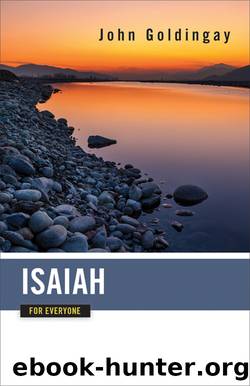Isaiah for Everyone by John Goldingay

Author:John Goldingay
Language: eng
Format: epub
ISBN: 9781611645606
Publisher: Westminster John Knox Press
Published: 2015-08-15T00:00:00+00:00
As a result of multiple sclerosis, my first wife, Ann, indeed had collapsing knees, as well as weak hands. When we were relocating to the United States, as we arrived at Heathrow, I was helping her transfer into her wheelchair by using a technique her nurses had taught me, bracing her knees against mine, but in swiveling from the car seat to the ground on the way to the wheelchair our knees lost contact, her knees folded, and I dropped her. In subsequent years she became mute, too. It wasnât that she knew what to say but had lost the ability to use her voice; the diseaseâs effect on her mental workings meant she could no longer think out what she wanted to say. Maybe being unable to speak was tougher than being unable to walk.
My heart therefore thrills at the image of the handicapped person jumping like a deer. It would be a sight to behold! What a further image, that a mute personâs tongue can resound! The promisesâ logic is that seeing Godâs great act of restoration will be so astonishing, it will compel such responses from limbs and mouths that lack the ability to move. The sight is a shock that electrifies them back to life, an extreme version of the way the whisper of a loved one may be able to arouse a response from someone in a coma. Perhaps it will be hearing Godâs voice calling or singing or whispering that will bring to birth the new life the vision portrays.
The prophecy doesnât directly portray Yahwehâs act of restoration. It portrays its reverberations in nature. Itâs like a poem in the way it teases the reader. Who are the âthose peopleâ to whom it points as the beneficiaries of Godâs act? Only in the last verses are they identified. Even there, it first rules out some peopleâthe unclean (for instance, people stained by the worship of other gods) and the stupid (people who havenât recognized that submission to Yahweh is the first principle of wisdom). As in English, in Hebrew the word âviolentâ usually applies to human beings not animals, so the lions and violent beasts may stand for another group of people who are excluded from the picture. The beneficiaries are the people redeemed and restored by Yahweh and brought back to Zion from the exile of which Isaiah warns.
The other animal reference, to jackals, draws attention to the way these two chapters form a diptych, a balancing pair. Like Jesus and Paul, the prophecy assumes that redress on the wayward and restoration for the committed go together, as two sides of a coin. Itâs as if God canât just focus on the nice idea of restoring his people but also has to face the less pleasant task of bringing punishment to the rebellious. The collocation also recognizes how the restoration of Godâs people commonly requires the putting down of their oppressors as its precondition. When Judah is in exile, being brought back to Zion will require putting down the power of the superpower that took them there.
Download
This site does not store any files on its server. We only index and link to content provided by other sites. Please contact the content providers to delete copyright contents if any and email us, we'll remove relevant links or contents immediately.
The 5 Love Languages: The Secret to Love That Lasts by Gary Chapman(9815)
The Space Between by Michelle L. Teichman(6939)
Assassin’s Fate by Robin Hobb(6216)
Wiseguy by Nicholas Pileggi(5784)
Everything Happens for a Reason by Kate Bowler(4743)
Gerald's Game by Stephen King(4654)
Pillow Thoughts by Courtney Peppernell(4283)
A Simplified Life by Emily Ley(4161)
The Power of Positive Thinking by Norman Vincent Peale(4064)
Harry Potter and the Prisoner of Azkaban (Book 3) by J. K. Rowling(3359)
Resisting Happiness by Matthew Kelly(3341)
Girl, Wash Your Face by Rachel Hollis(3282)
Being Aware of Being Aware by Rupert Spira(3276)
The Secret Power of Speaking God's Word by Joyce Meyer(3218)
The Code Book by Simon Singh(3189)
More Language of Letting Go: 366 New Daily Meditations by Melody Beattie(3029)
Real Sex by Lauren F. Winner(3022)
Name Book, The: Over 10,000 Names--Their Meanings, Origins, and Spiritual Significance by Astoria Dorothy(2987)
The Holy Spirit by Billy Graham(2952)
